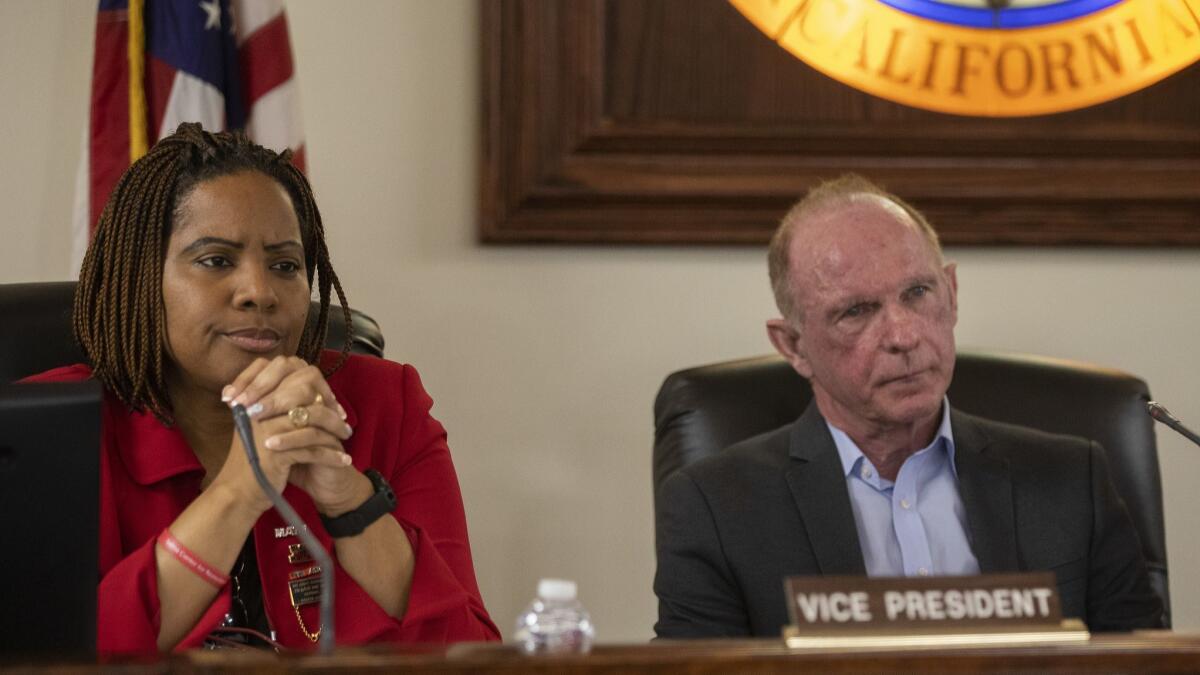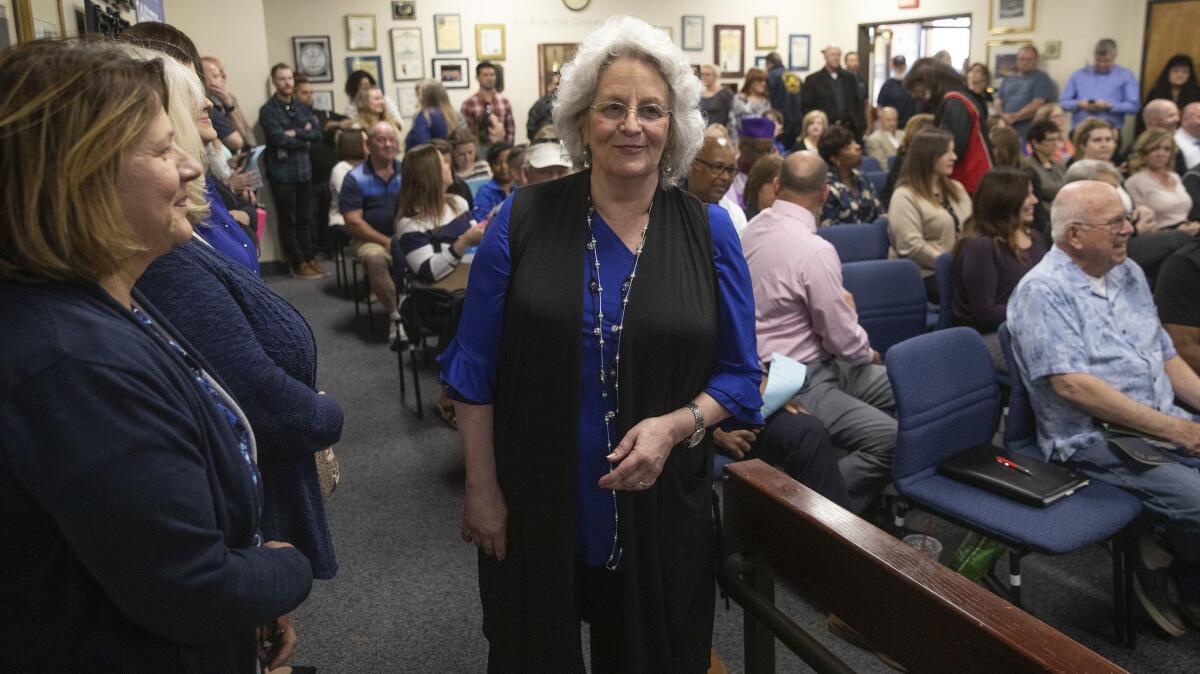At ‘buck wild’ meetings, racism and corruption allegations tear school district apart

- Share via
At an April meeting of the Antelope Valley Union High School District’s board, trustee Jill McGrady questioned why the board had hired a $400-an-hour attorney despite having an in-house lawyer and a contract with an outside firm.
Why hadn’t this new attorney provided a bill for two months of work? McGrady asked. Was he meeting privately with individual members of the board?
The discussion took an unexpected turn when board President Robert Davis accused McGrady of raising questions only because the attorney is black.
“I’m not going to participate in this racial game of, ‘Let’s move the goal post for the black man,’” said Davis — who, like McGrady, is white.
The audience exploded into jeers. “Racial!” one woman yelled. “How is this racial?”
For months, this high desert district of 22,000 students has been roiled by political infighting and protests — all with an undercurrent of race.
Residents have denounced the trustees for going on a spending spree even as they denied pay raises to school principals and other employees. Accusations of misusing public funds, providing contracts to friends and a duplication of services have led to a recall effort against trustees Davis, Victoria Ruffin and Amanda Parrell.
Among the board actions that have come under scrutiny: a $48,500 security consulting job given to a former colleague of Davis; an open-ended contract for a Ruffin acquaintance to create websites to reflect each trustee’s “personal brand or style”; and the hiring of the attorney, John W. Harris, who appeared to fall asleep during his first meeting, according to several people who were present. (Harris could not be reached for comment.)
Meetings have become must-see theater, with overflow crowds filling the lobby.
“They just get buck wild across the board,” Ruffin, the board’s vice president, said of recent meetings.
Since April, debates about contracts have been inextricable from debates about racism. A number of teachers said they fear that the trustees threatened with recall are using sweeping, exploitative rhetoric about race to divert attention from controversial decisions.
Davis and Ruffin said the recall effort is the result of people being uncomfortable with their attempts to expose problems.
“When we’re doing the hard work in social justice and we’re doing the hard work of being equity warriors, it does mean that people get an opportunity to look at your ways and your practices,” Ruffin said. “I can understand why that would be something that is scary.”
Parrell did not respond to requests for comment.
Few dispute that the Antelope Valley has wrestled with serious problems, many stemming from long-term social and racial inequities. The region has experienced dramatic demographic change over the last three decades, and now is 48% Latino and 15% black.
The high school district, which has an 87% nonwhite student body, held its first by-district board election in November after being threatened with a lawsuit alleging racial bias in its at-large voting system, district officials said.
Ruffin, who was elected at the time along with Parrell, is the first black woman to serve on the board. The director of special education for an Oxnard school district, she has spent years building a brand as a motivational speaker, activist and author of a memoir.
“If something happens to me, it’s because I’m fighting the good fight,” she said of her school board work.
At a special meeting in April, Ruffin, Davis and Parrell voted to launch a wide-ranging, independent investigation into alleged discrimination in the district’s hiring practices and the suspension and expulsion of nonwhite students.
Black students, who made up 18% of the district’s student body during the 2017-18 school year, accounted for 38% of suspensions, according to state data. High suspension rates for black students are a statewide issue.
Critics said the investigation could expose the district to financially devastating litigation.
“In today’s political climate, accusations of racism should be taken very seriously, not tossed out recklessly with no substantiating evidence or even a complaint, as is happening here,” Dan Shy, president of the Antelope Valley Teachers Assn., told the board.
Supt. David Vierra told The Times that the district has had three race-related complaints from parents since August 2017. In two cases, which were settled, the complaints were over a student’s grade; a third is under review.
After weeks of public outcry, Davis recently asked to call off the investigation.

Criticism of the board began to mount after a Jan. 24 meeting, when the trustees approved several deals — including a $75,000 contract with Valencia-based Full Circle Consulting Systems Inc. to conduct training aimed at improving students’ relationships with teachers and others.
Multiple teachers said the pilot program — called Students, Teachers, Officers, Parents — was wasteful because the district already paid for another, nationally recognized program with a similar mission, called Capturing Kids’ Hearts.
Glenda Potts, a teacher at Desert Winds High School, an alternative school in Lancaster, said STOP instructors made teachers do yoga breathing exercises and build towers out of marshmallows and raw spaghetti noodles as a team-building activity.
“There was nothing for us to take back to our students,” Potts said.
Rose Stanley, another Desert Winds teacher, told the board that instructors appeared to have spent no time in local classrooms. “Don’t be spending money on this,” she said. “We need the money for our students and for our programs.”
Two Full Circle representatives could not be reached for comment.
The board also approved a contract for D’Vacor Entertainment Group, a Bay Area event-marketing company, to create websites for each trustee — despite having a contract with Coffee House Industries, a Palmdale-based digital marketing agency that builds its websites. Ruffin said the individual sites would let trustees better communicate with constituents.
Rose Lyles, the managing partner for D’Vacor, told the board that each of the five websites would cost $4,000 to $5,000 upfront, then about $1,000 apiece each month for maintenance.
Lyles had consulted on Ruffin’s election campaign, and the two previously were board members for the Diverse Communities in Action Movement, an organization that aimed to create events such as marches and forums.
Ruffin also was listed online as a team member in California Black Expo Magazine, which Lyles runs. Ruffin told The Times she knew nothing about the magazine. A page from its spring 2018 edition that listed Ruffin’s name was taken offline shortly after The Times asked about it.
Lyles, who withdrew her contract with the district in April, declined to comment.
The board in January also approved the $400-an-hour contract for Harris, who has since charged the district at least $28,397.50, according to invoices obtained by The Times. It’s unclear exactly why the board hired another attorney.
The school board majority authorized Harris to review the contract of in-house attorney Bridget Cook, who had represented the district for 21 years. On May 9, the board fired Cook in closed session with little explanation.
The board also authorized Harris to review the contract of Vierra, the longtime superintendent.
Davis has been openly disdainful of Vierra, saying he fostered a culture of nepotism because several of his family members had worked for the district, including a brother who once worked as an assistant superintendent. Vierra said he always has received positive evaluations but could not talk about closed-session discussions about his contract.

Much of the opposition to the board’s majority bloc has come from teachers.
Davis recently called two special meetings that some alleged were timed to decrease attendance. One was at 10:30 a.m. on a school day. Dozens of teachers used sick days to attend. In an interview later, Davis scoffed at their presence.
“I love all those teachers being there,” he said, “but all those teachers had to have subs today. So what did that cost the district?”
Last spring, the Antelope Valley Teachers Assn. called on Davis, a retired corrections officer who has been a trustee since 2015, to resign, saying he was using a recent school shooting for political gain.
On May 11, 2018, a 15-year-old boy was wounded in a shooting at Highland High School in Palmdale. Davis took out an ad in the Antelope Valley Press, writing that when he went to see the boy in the hospital he found “cold empty corridors, no one, and nobody,” suggesting he was the only district official to visit. He echoed the claims in social media posts that a district spokeswoman denounced as false.
At a board meeting days after the shooting, Davis accused the then-school board president of not taking safety seriously and said anyone who supported him “will carry the same blood on their hands.”
Asked about teachers’ criticism of that speech, Davis said, “Absolutely it was politically motivated.”
“They don’t control me,” he said of the teachers union. “No one controls me.”
Ruffin beat the former board president, who also is black, in the November election. Davis became president the next month.
In December, Davis spoke with Bruce Frank, a retired corrections officer who had worked with him at California State Prison in Lancaster, about possibly assessing the school district’s security, Frank told The Times. That month, the Internal Revenue Service placed a $117,539 lien on Frank’s property, according to Kern County records. Frank did not respond to questions about the lien.
Frank said the call with Davis led him to start a security consulting company, K12 Secure. It was registered as a business with Kern County on Feb. 5, county records show. On Feb. 14, the board approved a $48,500 contract proposal making the school district K12 Secure’s first client. The district already has a $1.7-million contract with the Los Angeles County Sheriff’s Department, with a deputy assigned to most campuses.
Frank said that he had done security assessments for prisons for at least 20 years and that the work with the district is “not my first security audit.”
As in the case of Harris, Davis at the April 11 board meeting accused McGrady, a retired teacher, of questioning the contracts with Frank, D’Vacor and Full Circle because the vendors were black — eliciting boos from the audience. At the same meeting, Ruffin suggested that school staff have low expectations for black students and push them to apply to junior colleges instead of four-year universities.
She referenced black male students at Knight High School in Palmdale with 4.4 grade-point averages who played varsity basketball and went to community college.
“A lot of these kids end up being pimped for their skills,” said Ruffin, whose daughter recently graduated from the school. “They’re wonderful athletes, and they can run and run and run, but they don’t land in colleges.”
Amos Wellington, a black teacher and coach at Eastside High School in Lancaster, said he thinks the trustees are trivializing a very serious issue by wielding claims of racism for political means.
“I am hypersensitive to the term ‘pimp’ and the term ‘racism’ because they affect me directly,” he said. “I’ve taught and coached girls since 1994, and I will protect my male students and my female students if it costs me my life.”
In an interview, Ruffin said she was not talking about all coaches, just some at Knight High. Ruffin said she was unapologetic.
“If you’re good enough to run and play basketball, if you’re good enough to be eligible during the season but you’re failing after the season … where was the vested interest in their academics?” she said. “Were you just seeing them as a mule to play a sport for you? Or do you really see them as a human being?”
Times staff writer Ryan Menezes contributed to this report.
More to Read
Sign up for Essential California
The most important California stories and recommendations in your inbox every morning.
You may occasionally receive promotional content from the Los Angeles Times.












